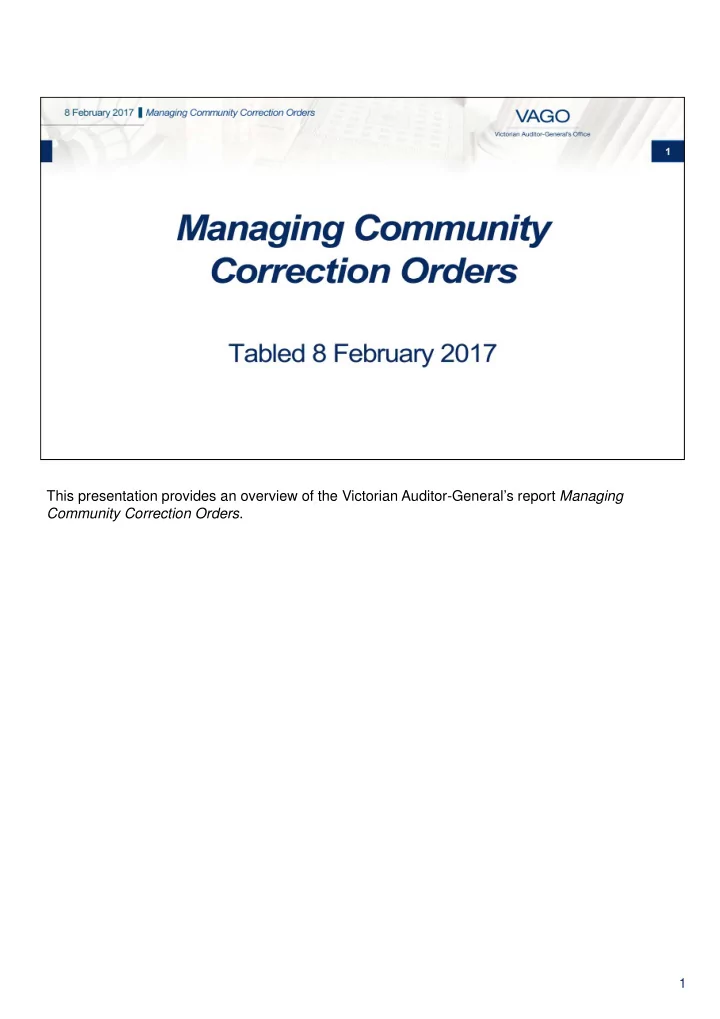

This presentation provides an overview of the Victorian Auditor-General’s report Managing Community Correction Orders . 1
A modern justice and corrections system aims to balance the community’s desire to punish and denounce offenders with a practical need to reform and rehabilitate individuals so they can return to a law-abiding life after they have served their sentence. As an alternative to imprisonment, managing some offenders in the community offers significant cost savings and social benefits. A community correction order (CCO) is a sentence imposed by a court that allows offenders to complete their sentences in a community setting. Offenders on CCOs may have to comply with specific conditions imposed by the courts, such as mandatory drug or alcohol treatment, curfews or judicial monitoring. A social benefit of CCOs is that sentenced offenders have the opportunity to maintain and improve their social and economic support networks in a community setting. Offenders who receive community-based sentences also tend to have much lower rates of reoffending. 2
Corrections Victoria (CV) is part of the Department of Justice and Regulation and is responsible for directing, managing and operating Victoria’s adult correctional system, including CCOs. Since 2012, there have been a number of changes to legislation and sentencing practices. These changes have triggered an increase in the number of offenders on CCOs, almost doubling from 5 871 in 2013 to 11 730 in 2016. 3
In 2015 CV conducted a major internal review of one of its divisions, Community Correctional Services (CCS), which identified some urgent challenges in the CCO system including: • system challenges in managing unexpected growth • legislative changes driving more serious offenders serving CCO sentences • challenges in recruiting and training appropriately qualified staff, and • case management roles for managing serious offenders being filled by inexperienced staff. The review proposed extensive reforms to human resources, work processes, facilities and technology to address these issues. In the 2016-17 State Budget, the government invested $233.4 million in the community corrections system over the next four years. This includes funds to deliver most of the reforms proposed in the review, which are expected to be fully implemented by January 2019. 4
In this audit, we examined how effectively CV manages CCOs. We also looked at: • the Department of Health and Human Services (DHHS), to assess how well it coordinates rehabilitation and support programs with CV • Victoria Police, to examine how well it exchanges information with CV about offenders on CCOs. 5
CV’s reform program is comprehensive and aims to address the key management issues arising from the growing number of high-risk offenders on CCOs who require attention. CV’s plan to recruit significant numbers of new staff including experienced staff should reduce case loads, making effective offender management more likely. CV’s information management is inefficient, and there is no single source of accurate data on offenders, which increases the chance of error. CV has not been able to secure funding to develop an integrated offender management system, which means the problems are likely to continue. CV’s stakeholder engagement has generally been good and although initially it did not engage with the courts at the planning stage, CV is now taking steps to engage with the courts on its proposed service reforms. 6
Current practices for managing offenders are not effective due to the overwhelming number of offenders and the lack of trained staff. Average wait times for support programs for offenders are excessive. To better manage risks to community safety, CV also needs to review its process for managing offenders who do not comply with their CCO conditions, especially the process for taking offenders back to court for breaches of conditions. CV is trying to incorporate some elements of the Neighbourhood Justice Centre’s highly integrated model for effectively managing offenders on CCOs into its services. 7
The current measures used to assess CV’s performance are based on outputs and compliance with limited focus on outcomes. CV plans to introduce a new set of outcome measures which, if effectively implemented, will provide better information about CV’s performance. Currently, CV’s business processes are inefficient, and data about CV’s monitoring and reporting of CCOs is fragmented, which impedes timely decision-making and effective coordination. CV needs to make sure its information systems are effective, efficient, integrated and robust, to enable it to collect, monitor and report on its activities and achievements. 8
The growing number of higher-risk offenders on CCOs has added extra complexity to a system that is already struggling with high growth and high case loads. We made 12 recommendations directed to CV, one recommendation directed to Victoria Police and one recommendation directed to DHHS. These changes seek to improve: • the management and monitoring of offenders on CCOs • the communication between CV, Victoria Police and the courts • the processes for reporting, monitoring and evaluating support programs. All recommendations have been accepted. 9
For further information, please see the full report of this audit on our website, www.audit.vic.gov.au. 10
Recommend
More recommend